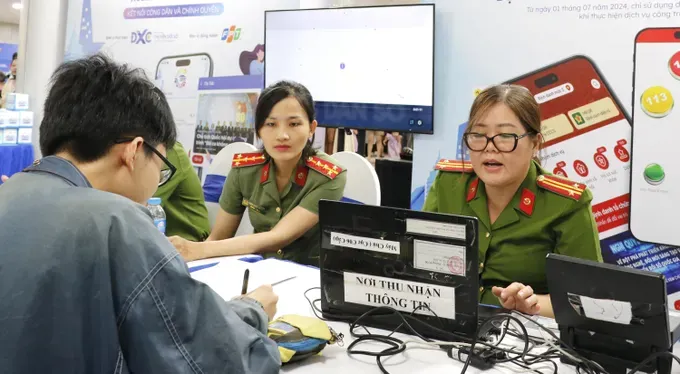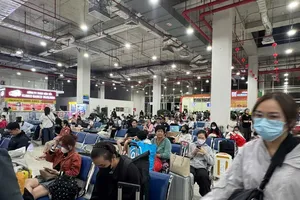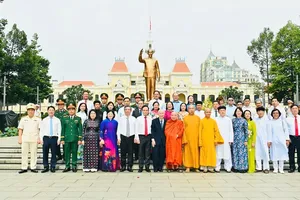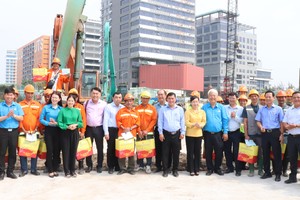
In early July, Nguyen Van Hung from An Phu Dong Ward of HCMC visited Gia Dinh People’s Hospital. There, he was guided to a smart kiosk where he registered his fingerprint and scanned his chip-based citizen ID card (CCCD) to select his desired service and clinic, and receive a queue number. The entire process was completed within approximately 5 minutes, allowing him to register and pay online without queuing at a counter, saving a significant amount of time.
This smart kiosk model is one of the innovative initiatives stemming from the government’s national project on developing applications for population data, electronic identification, and authentication for the 2022-2025 period with a vision to 2030 (Project 06).
Mai Phan Tuong Anh, MD PhD, Deputy Director of Gia Dinh People’s Hospital, explained that patients only need to register their fingerprint once. For subsequent visits, a simple scan allows them to proceed directly to their clinic, reducing wait times by 30 to 60 minutes, easing pressure on reception staff, and improving patient identification accuracy.
Beyond this, the HCMC health sector is rolling out numerous other Project 06 applications, including registration via chip-based citizen ID card and VNeID, integration of Electronic Health Records on VNeID, and data linkage for issuing digital birth certificates, death notices, and driver’s health certificates, alongside widespread adoption of cashless payments.
HCMC is also striving to lead in administrative digital transformation. The use of the VNeID electronic identity application simplifies many procedures by synchronizing the electronic one-stop-shop system, reducing red tape and document duplication. Project 06 has become deeply integrated into daily life, contributing significantly to building a digital government and society.
A key example is the HCMC Digital Citizen app, launched in late 2024, which allows residents to handle administrative procedures like passport applications, driver’s license renewals, criminal record checks, feedback submission on social security from home via the VNeID app.
Statistics from the Ministry of Public Security reveal that as of late April 2025, the banking sector has cross-referenced 113 million customer profiles with biometric data from chip-based citizen ID cards. In healthcare, 222 facilities have joined the pilot, contributing over 2.2 million electronic medical records to the system. Additionally, cashless payment solutions have been deployed at over 700 parking locations nationwide.
Since the two-tier local government system launched in early July, HCMC has been at the forefront of processing administrative procedures independent of geographical boundaries. At commune-level Public Administrative Service Centers, teams of officials, civil servants, police officers, and youth volunteers guide citizens through online procedures and VNeID updates daily.
During a survey by the HCMC National Assembly Delegation yesterday morning, July 10, Lieutenant Colonel Nguyen Quoc Tuan, Head of Dong Hung Thuan Ward Police Station, reported that five officers are sited at the local service center to assist citizens with VNeID. Staff are also on duty 24/7 to update citizen data as needed. Furthermore, HCMC Police are conducting a “90-day campaign” to clean up marital status data to streamline future verification procedures.
Regarding the national progress of Project 06, Deputy Minister of Public Security Nguyen Van Long stated that 56 of 76 essential public services are now integrated into the National Public Service Portal. All provinces and cities are now using digitized land data for residence-related procedures, and approximately 80 percent of social insurance benefits are disbursed via ATM cards.
The Ministry of Public Security has also proposed a plan, in commemoration of the 80th War Invalids and Martyrs’ Day, to use data and DNA methods to identify the remains of fallen soldiers, with a goal of identifying 100 percent of relatives of unidentified martyrs by 2027.
The Ministry’s leadership has urged all government bodies to upgrade their information systems to avoid service disruptions and to accept digital documents from VNeID accounts as legally equivalent to paper copies, eliminating the need for citizens to present or notarize physical papers.
The National Data Center is expected to go live in August 2025, providing the infrastructure to connect and leverage 114 national and specialized databases. Meanwhile, the Police Department for Administrative Management of Social Order is piloting a centralized digital signature portal on the VNeID platform.
This represents a significant step toward securing all electronic transactions, from public services and finance to commerce and healthcare, building a modern, citizen-centric digital society.
More importantly, Minister of Home Affairs Pham Thi Thanh Tra has recently signed the ministry’s Digital Transformation Plan for 2025. Key targets include ensuring 100 percent of inter-agency documents are electronic and digitally signed, and that at least 80 percent of public services are fully online and mobile-accessible.
The plan also mandates that 100 percent of ministry staff receive basic digital skills training and apply AI in their work; 80 percent are trained in information security; 80 percent of subjects under the state management scope of the ministry are electronically identified while having their information digitized and stored at the databases of the home affairs sector.
Crucially, the plan stipulates that the results of digital transformation will be used as a key performance indicator for evaluating ministry leaders. One of the seven primary tasks outlined is the operation of the home affairs sector’s open data portal, which will be populated with “concise and comprehensive” data from the National Database of Officials, Civil Servants, and Public Employees.
























